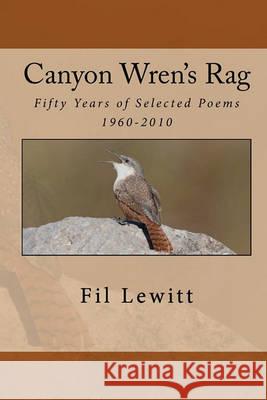Canyon Wren's Rag: Fifty Years of Selected Poems 1960-2010 » książka
Canyon Wren's Rag: Fifty Years of Selected Poems 1960-2010
ISBN-13: 9781456437824 / Angielski / Miękka / 2011 / 156 str.
"Canyon Wren's Rag," under the imprint of Fictional Enterprises, brings together 276 poems, containing fifty years, 1960-2010, of the selected poems of Fil Lewitt, accompanied by some of his drawings. It is the COMPANION VOLUME to "The Zen Follies" (2010), which is an illustrated, non-fiction, mostly prose book of autobiography, stories, tales, aphorisms, and essays about one man's journey into American Zen Buddhism. "Canyon Wren's Rag" is in some sense more of the same, but all in poetry, a medium in which Fil Lewitt has been working steadily since the age of fourteen, not a medium that can ever be perfected, but one in which there is constant growth and change. Many of the poems are sonnets, and many are funny, though Lewitt writes no doggerel; the humor is indwelling, with many puns and plays on words. There is also a sense of wonder at the strange worlds we all inhabit, as well as the tunes and music inherent in words. There are nine chapters or sections, which are presented mostly chronologically, though finally based more on content than on strict chronology. The chapters are: "Big River; Old World; Advice from Uncle Etcetera; Monastery in Ragtime; Potted Palms; Thin Air; The Narrow Road to the Far East; Mangos in Moonlight; Sonnets To A Muse." Each chapter's poems are from a different place and a different time. Lewitt's poetry is not sentimental, nor is it about religious faith, though the poems trace a path through a life both of the spirit of being human and of the nature of hard work and play. He has been a Zen Buddhist for more than forty years. If you hate poetry, you probably won't like it; but if you can even stand poetry, you probably will. Nothing can adequately describe a poem, so try this one, titled CLUTTER: "words, / revolving, / too many women / none loves. // I threw out my furniture / today: ate an apple, / brown rice in a bowl, green tea. / Where are you, / big river?" Or this line from another poem: "calling all birds with one note / whistling in the breeze." Even long after the big bronze bell has been struck, the reverberations continue outward in waves.
Zawartość książki może nie spełniać oczekiwań – reklamacje nie obejmują treści, która mogła nie być redakcyjnie ani merytorycznie opracowana.











